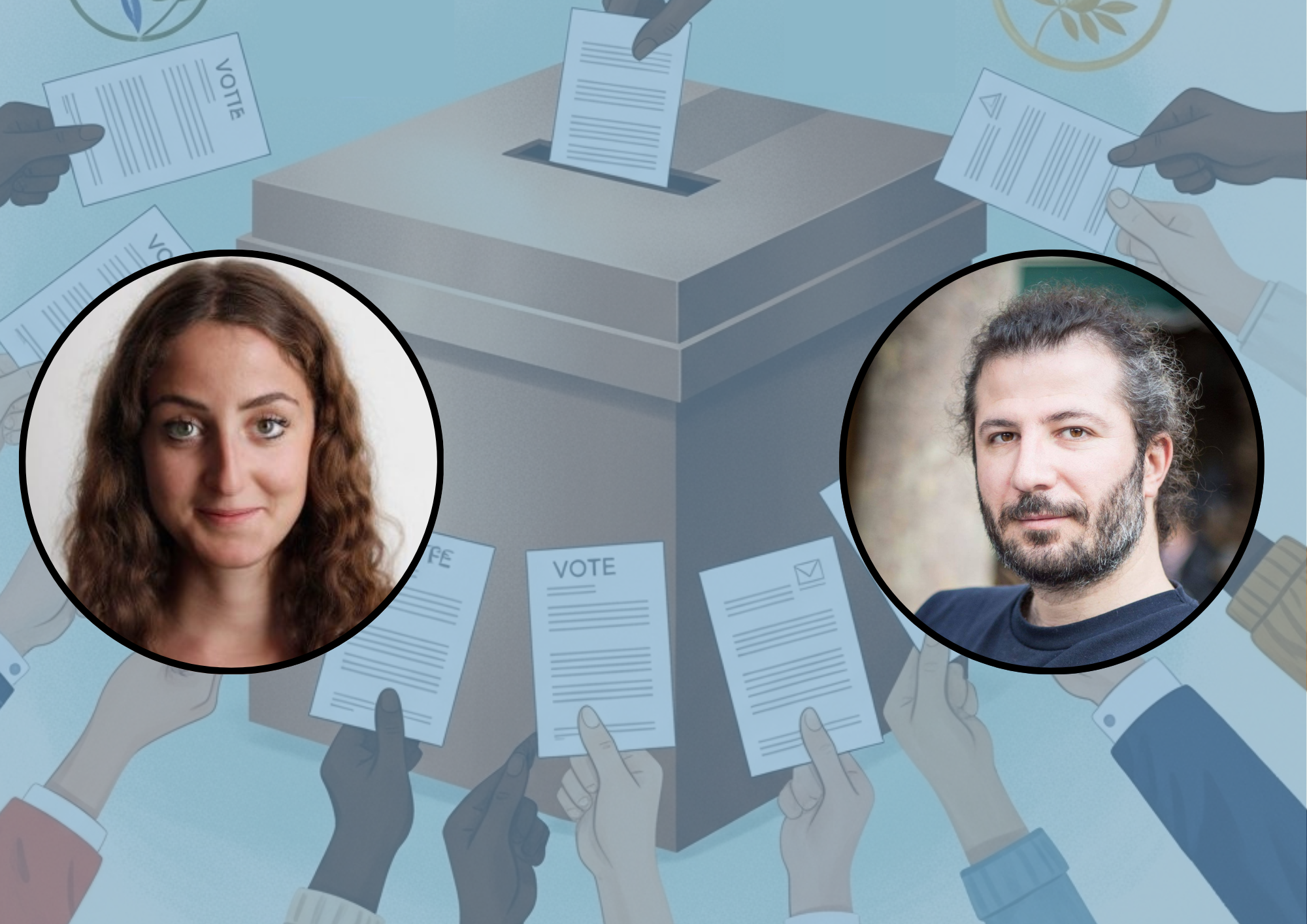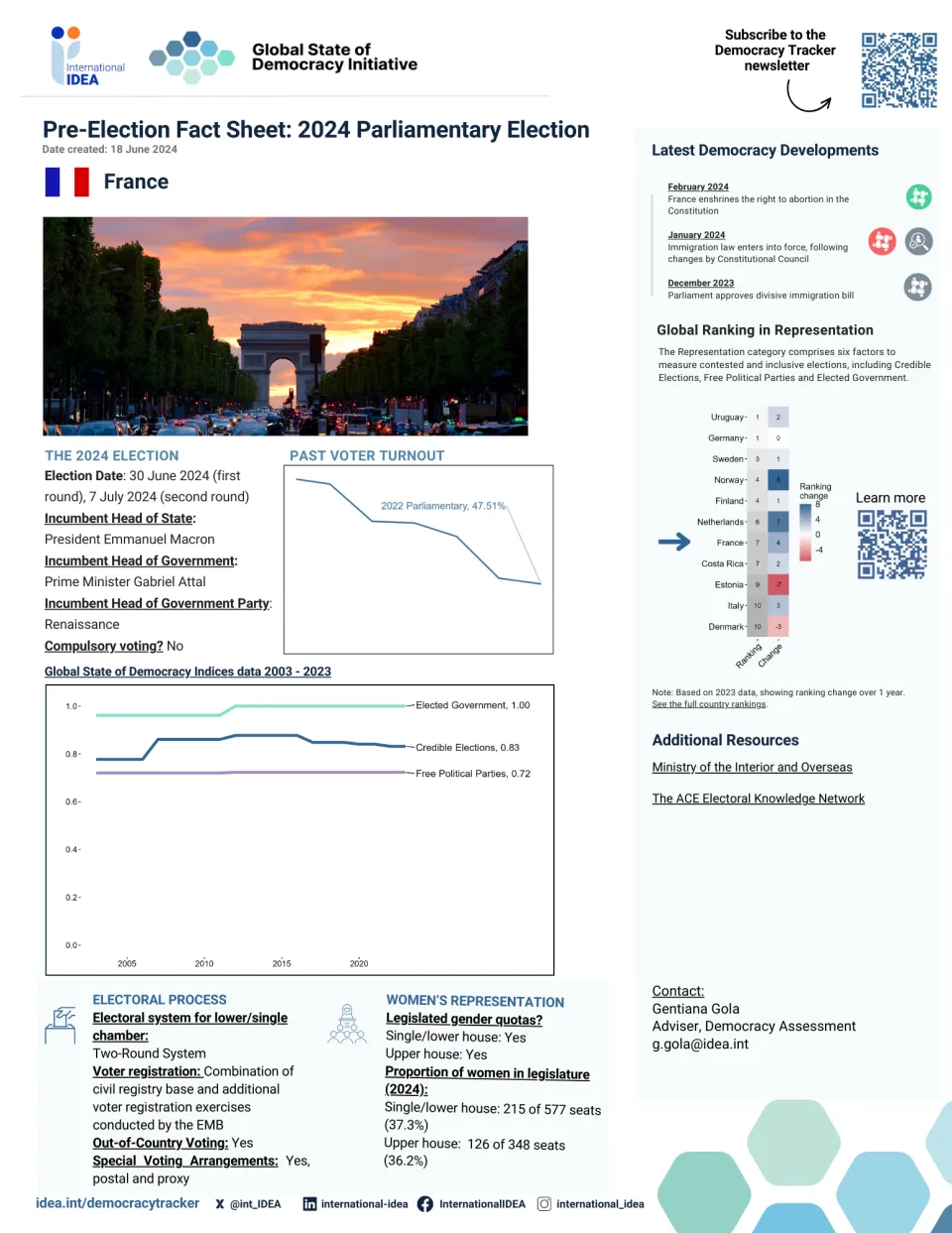
France
France is high performing across all categories of the Global State of Democracy framework. The country performs in the top 25 per cent of countries around the world in every factor except Electoral Participation. Between 2019-2024, France experienced advances in Civic Engagement, particularly with regard to engagement in independent political associations. France has also advanced in Effective Parliament, specifically related to the legislature’s investigatory and executive oversight functions. The country has also experienced declines in Access to Justice and in Economic Equality. Though France is a high-income country, it struggles with mounting public debt and growing public dissatisfaction with income inequality, which has been on the rise since the 2008 financial crisis. France’s economy is dominated by the services sector, and to a lesser extent manufacturing, tourism, and agriculture.
France evolved from Gaul, which was inhabited by Celtic tribes before being conquered by the Franks in 476 AD. The rise of the French monarchy was closely linked to the growing influence of the Catholic Church. The monarchy was overthrown during the French Revolution in 1789, marking the beginning of a complex history of alternating monarchies and republics. France adheres to the principle of laïcité (secularism), which holds a central place in public life, among other core republican values. Modern debates about French national cultural identity also reflect discussions about how to handle the ways in which globalization threatens French identity.
The history of French colonialism has resulted in a multicultural population, which struggles with ongoing discrimination, including in overseas departments and territories. This came to the fore recently in New Caledonia (with regard to Indigenous representation) and in Mayotte (with regard to citizenship). The treatment of migrants and refugees by public authorities, including border police, has also drawn attention.
Participation remains robust, and the government has successfully convened citizens’ assemblies to give people a voice on topics ranging from climate change to assisted dying. France also has a long history of citizens taking to the streets to express their dissatisfaction with government policies or social issues. Recent examples include pro-Palestine protests, and protests over economic inequality, environmental causes, government corruption and pension reform.
France is consistently high performing in Gender Equality. Legal frameworks that support gender equality and LGBTQIA+ rights are advanced, and in 2024 France became one of the first countries globally to protect the right to abortion in the Constitution. However, women’s economic marginalization persists in the form of unpaid care and domestic work, as well as a gender gap related to wages, labour market distribution, and senior positions in government agencies and companies, particularly corporate executive committees. Additionally, the prevalence of physical and sexual violence, as well as what are sometimes seen as insufficient responses by authorities, remain an obstacle.
Looking ahead, it will be important to watch debates around immigration laws as well as ramped up efforts to dismantle migrant smuggling networks, which should be monitored for their impacts on the rights of asylum seekers and refugees. In addition, it will be important to monitor reports of police brutality in response to demonstrations for impacts on Civic Engagement. Finally, it will be important to watch new measures expanding support to victims of gender-based violence, and a proposal to strengthen consent laws, for impacts on Gender Equality.
Last Updated: June 2025
https://www.idea.int/democracytracker/
October 2025
Parliament approves definition of rape based on consent
On 29 October, Parliament passed an amendment to the penal code, adding consent to the legal definition of rape and sexual assault. While previously the definition was limited to the use of violence, coercion, threat or surprise, it now extends to all sexual acts performed without ‘free, and informed, specific, prior and revocable’ consent. The debate over the necessity of the reform was reignited following the December 2024 trial connected to the Gisèle Pelicot case, who was the victim of serial rape while drugged by her now ex-husband. The law specifies that consent must be evaluated according to the circumstances and cannot be inferred from ‘silence or lack of reaction’ of the victim. The legislation was introduced by MPs from the Green and Renaissance parties in January 2025, following a parliamentary fact-finding mission, and was promulgated by President Emmanuel Macron on 6 November.
Sources: BBC, Le Monde, DW, Vie Publique, Ministry Responsible for Equality between Women and Men and the Fight Against Discrimination, French Government
May 2025
Court upholds stricter birthright citizenship in overseas department Mayotte
On 7 May, the Constitutional Council upheld legislation tightening access to French nationality in Mayotte for children born to foreign parents. A 2018 immigration law had already established stricter rules in Mayotte compared to mainland France, requiring one parent to have regularly resided on French territory for three months at the child’s birth. The new law, passed on 9 April 2025, extends the requirement to one year and to both parents (unless only one parent is listed on the birth certificate). The law was referred to the court by MPs, arguing it introduces differentiated access to nationality based on birthplace and disregards the principle of equality before the law. The Council ruled it constitutional under Article 73, which allows legal adaptations for overseas territories, citing Mayotte’s specific ’characteristics and constraints’ including high migration levels and a large share of foreign nationals.
Sources: Verfassungsblog, Constitutional Council (1), Constitutional Council (2), Legifrance, Le Monde
April 2025
ECHR finds failure to protect three applicants in rape cases
On 24 April, the European Court of Human Rights (ECHR) ruled that French investigators and courts failed to adequately protect three minors, aged 13, 14 and 16, who had reported rape. The Court found that the criminal proceedings lacked due care, failed to properly account for the applicants’ status as minors and the vulnerable situations at the time of the events. The judgment found violations of the prohibition of inhuman or degrading treatment (Article 3) and the right to respect for private life (Article 8) in all cases. It also found a breach of the prohibition of discrimination (Article 14) in one case, due to the national authorities’ use of gender stereotypes and ’moralising and guilt-inducing statements’. France was ordered to pay around EUR 60,000 in financial compensation and legal costs. Parliament is currently considering legislation that would explicitly require ’free and informed’ consent in the Penal Code’s definition of rape.
Sources: AP News, European Court of Human Rights, La Depeche, European Convention on Human Rights, Jurist News, The Local, Amnesty International, Le Monde
February 2025
ECHR finds rights violation in death of environmental activist
On 27 February, the European Court of Human Rights (ECHR) found a violation of the right to life in the case of a student killed during a protest in 2014. The student died as the result of a grenade explosion as police dispersed protesters opposing the construction of a dam in Lisle-sur-Tarn. The dam project was later cancelled, and rallies were organized in tribute to the student across France after his death. The court found authorities failed to ensure the requisite level of protection to avert risk to life, and found failures of the gendarmerie’s management in the conduct of the dispersal operation. The ECHR ordered France to compensate the student’s relatives with a fine (between EUR 5,600 and EUR 16,000). The ruling highlights police tactics and the use of force during protests, prompting calls for reform and setting a precedent for victims of police violence.
Sources: ECHR (1), ECHR (2), RFI, JURIST, RadioFrance, Le Monde, franceinfo, Public Senat
See all event reports for this country
Global ranking per category of democratic performance in 2024
Basic Information
Human Rights Treaties
Performance by category over the last 6 months
Blogs
Election factsheets
Global State of Democracy Indices
Hover over the trend lines to see the exact data points across the years
Factors of Democratic Performance Over Time
Use the slider below to see how democratic performance has changed over time


